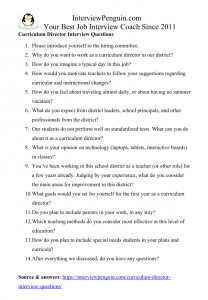Table of Contents
Please introduce yourself to the hiring committee.
You should tell them a story. A story that starts with your undergraduate degree in education, continues with a few years of teaching experience and Master’s degree in curriculum and instruction, and eventually culminates in a point when you understood the impact you can have on the entire school district as a curriculum director, and decided to apply for the job.
Please remember that representatives of various stakeholders may sit in the committee–superintendent, senior teachers, school administrators, parents. These people are not professional interviewers, and consider your application through different optics. Who you are, what you like to do, whether you seem genuinely interested in the students, are some of the questions they have on their mind.
For this reason you should tell them also something about your personal life. Whether you have children, whether they attend school, some leisure time activities. These things are important to make a good connection with the interviewers.
Why do you want to work as a curriculum director in our district?
Start with addressing the first part of the question–your job choice. You can say that you tried different roles (teaching, administering), and enjoyed all of them, but once you understood the ins and outs of the job of curriculum director, your made a choice.
Say that you believe to have the ability and experience to improve the quality of education in the district,by improving curricula and teaching standards. You have a vision, and you follow your vision.
Addressing the second part of their question, you have a few options. You can either say that you’ve been working in the same district for a long time, know the teachers and administrators, understand the strengths and weaknesses of the curricula. Perhaps your children attend one of the schools in the district.
Another option is praising the heads of the district for something. You can say that you admire their innovative approach to education, good student test scores, working environment, or anything else. People love when we recognize their good works and achievements. You should not think twice when you get this opportunity in an interview…
How do you imagine a typical day in this job?
You should show realistic expectations, and proactive approach to work. That includes traveling to schools in the district, talking to teachers and administrators, observing teachers in classes, reviewing textbooks, arranging workshops for teachers (to introduce new instructional techniques).
Analyzing the data you collected at schools while back in your office, trying to find areas for improvement and incorporating them in the curricula is also an important part of the job.
Remember that interviewers observe way more than just your words. Can they hear enthusiasm in your voice? Do you seem to be genuinely interested in this work? Do you talk in a way each committee member (including a representative of parents) can understand?
How would you motivate teachers to follow your suggestions regarding curricular and instructional changes?
You will find at least a few stubborn teachers at each school. They have been following the same instructional methods for years (sometimes for decades) and are highly reluctant to any changes. What’s more, since you work for an entire district, you typically won’t have time to oversee the work of each teacher.
You can suggest a few options at this point. Organizing workshops (especially for senior teachers), helping them to get into the new methods is one way of motivating them to follow your lead. Another idea is cooperating closely with principals or their assistants, who will help you to identify teachers who struggle to adapt to changes, and you will work with these teachers one on one later on.
You can also stress importance of creative feedback, and individual approach to each teacher. You certainly do not consider yourself infallible, and plan to have your ears open to criticism from teachers or from anyone else in the district.
How do you feel about traveling almost daily, or about having no summer vacation?
Ensure them that you are aware of the downsides of this job. After all a perfect job doesn’t exist. If you weren’t ready to work in the summer you’d remain teaching, and would not apply for a job of a curriculum director.
But you see the meaningful purpose of the job, the possibilities to positively impact the life of hundreds or even thousands of students in the district, and the positives clearly outweigh the negatives–at least in your view.
Special Tip: You can download the list of all questions in a one page long PDF, and practice your interview answers anytime later:

What do you expect from district leaders, school principals, and other professionals from the district?
You will need their help to succeed in your job, and you should ensure them that you are a team player. Say that you hope to have regular meetings with the heads of the district. They should help you identify areas for improvements in the curricula (at least indirectly).
What’s more, since you’ll be traveling from one school to another it is important to have good relationships with the leaders of various schools in the district. Open communication, honest feedback, and a mutual understanding and help is something you can definitely expect from them–and they can expect the same from you.
Our students do not perform well on standardized tests. What can you do about it as a curriculum director?
You can start by saying that improving results of students is one of the goals you will set for yourself, if they hire you for the job.
Then you will have to identify areas in which they fail, and how this can be addressed with the changes to curricula and instructional methods.
But such things cannot be studied distantly, from a comfy chair in your office. You will have to (and you want to) inspect the teachers in classes, interview both teachers and students, do your own tests with the students, collect feedback on teachers, and so on, and so forth.
Basically you can say that beside other goals, your entire daily job will turn around your efforts to improve the results of the students.
What is your opinion on technology (laptops, tablets, interactive boards) in classes?
Try to look at the question from a position of a curriculum director, and not a position of a teacher. We cannot turn back the clock, technologies are here to stay. Say that modern educational technologies can actually help you to collect important (and anonymized) data about students in various classes, which can actually give you some ideas about how you can improve the curricula, or which teachers you should talk to or observe in classes.
You can also say that instead of fighting against technology, you try to identify the most appropriate way to use it for the benefit of both students and teachers.
Some other questions you may face in your curriculum director interview
- You’ve been working in this school district as a teacher (or other role) for a few years already. Judging by your experience, what do you consider the main areas for improvement in this district?
- What goals would you set for yourself for the first year as a curriculum director?
- Do you plan to include parents in your work, in any way?
- Which teaching methods do you consider most effective at this level of education?
- How do you plan to include special needs students in your plans and curricula?
- After everything we discussed in this interview, do you have any questions?
Few interview tips for future curriculum directors
Remember that most people in the hiring committee are not professional interviewers. They are teachers, education administrators, parents. Try to keep the needs and goals of the stakeholders they represent on your mind, and refer to them in your answers.
Formal and informal leadership exists in each group of people. Sometimes the superintendent, and another time a teacher may have a decisive word in the hiring committee. Keep it on your mind, and try to make a good connection with each member.
Needless to say, try to learn as much as possible about their school district. Number of schools, number of students, organizational structure, results their students achieve on standardized tests, problems the district faces, careers of leading figures.
The more you know about them, the easier it will to be make a good connection. The better connection you manage to make during the interview, the better your chances of succeeding will be…
May also interest you:
- Reading specialist interview questions.
- School principal interview questions.
- Admission counselor interview questions.


